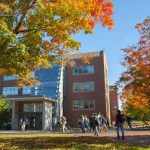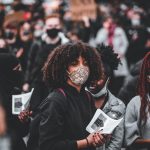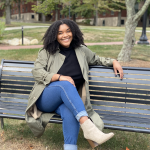UConn Today - December 1, 2020
Everyone in the world is facing the challenges and changes presented by the COVID-19 pandemic. But people of color may face additional barriers to staying healthy. A group of researchers from the University of Connecticut Department of Communication studied people of color’s attitudes and behaviors related to COVID-19 through the Institute for Collaboration on Health, Intervention and Policy’s (InCHIP) Rapid Response seed funding program. After seeing a viral tweet in which a Black man expressed discomfort wearing makeshift face coverings, Katrina Webber, a Ph.D. student and graduate assistant, wanted to investigate the topic. Read more >
Meet the Researcher: Brianna Chance, Music '23
UConn Today - October 15, 2020
Brianna Chance ‘23 (SFA) says the philosophy of “try everything” is what led her to rewarding research experiences during her first year at the University of Connecticut. Chance, a music education and vocal performance major from New Haven, was intensely involved in her school music programs before college. Chance credits the music educators in her life as the people who helped her the most, helping her through difficult situations. “They were the people I could rely on,” Chance says. “So, I said I needed to do this because it saved me as a kid. It’s a tribute to myself and the people who helped uplift me.” During her first year at UConn, Chance was part of La Comunidad Intelectual, a Latinx living and learning community. Chance and her peers quickly recognized there were relatively few Latinx people working in higher education. “All the students felt this sense that there weren’t many people who looked like ourselves at UConn,” Chance says.
Diana Rios, associate professor of communication and member of El Instituto: Institute of Latina/o, Caribbean, and Latin American Studies, began collecting testimonials and data about Latinx students’ experience at UConn through the learning community’s class. “We tried to examine why there were not many people who look like me in the field and how we can change it,” Chance says. Chance spoke to members of her learning community and alumni from different majors and ethnicities. She then presented the findings of this research at a professional conference with Rios. “It was so gratifying,” Chance says. “For me it was almost a form of activism and education. Being able to voice that concern to a bunch of people from all over the U.S. meant so much to me.” Read more >
 Women who do this when they get a compliment at work can be perceived badly
Women who do this when they get a compliment at work can be perceived badly
Ladders.com - September 16, 2020
The way in which we respond to compliments can carry weight. Whether it’s your boss telling you job-well-done for completing a big project or grabbing your co-worker a cup of coffee before the start of the day, most of the time something like “thank you” should suffice.
However, it is a bit different with women.
Anything beyond a simple thank you can carry consequences and even present them as less favorable — a concerning finding —, according to a recent study.
Two researchers published their findings in the journal Sex Roles where they explored the online dating world. While dating apps have taken over due to the ongoing coronavirus pandemic, the study authors — Maria DelGreco and Amanda Denes — titled their article “You Are Not as Cute as You Think You Are,” which tackles the science behind giving and receiving compliments via online dating platforms. Read more >

New Course Introduces Students to US Anti-Black Racism
UConn Today - September 4, 2020
In the months since Breonna Taylor and George Floyd were killed by police last spring, public outrage over anti-Black racism has inspired widespread protests, conversations and calls for reform. It is a movement with origins both recent and centuries old, and continues to spark in protest, as in the recent case of Jacob Blake, a black man shot by police in Kenosha, Wis. For students at the University of Connecticut, a new course will introduce them to the foundational history of systemic and anti-Black racism in the U.S. that underlies the current movement.
The course, U.S. Anti-Black Racism, is a 1-credit hour offering. It will be available as a free, online course to UConn students with plans to open the course to other members of the UConn community. Read more >

UConn Program Aims to Improve Engineers' Communications Skills
UConn Today - August 19, 2020
A professional education program is being developed at UConn to hone the communication skills of engineers. It’s an interdisciplinary program being coordinated by Rory McGloin, an associate professor in the Department of Communications of the College of Liberal Arts and Sciences, and Kylene Perras, the Director of Strategic Initiatives and Professional Education in the School of Engineering. Read more >

InCHIP Funds 20 Projects on Social, Behavioral Aspects of COVID-19 Pandemic
UConn Today - August 17, 2020
As the country scrambled in the face of the global coronavirus crisis, the Institute for Collaboration on Health, Intervention and Policy (InCHIP) at the University of Connecticut quickly rallied to establish a funding mechanism for 20 projects studying the social and behavioral implications of the COVID-19 pandemic.

Exploring the Effects of Social Isolation on Couples during a Pandemic
UConn Today - July 17, 2020
During the time of COVID-19, life as we know it has irrevocably changed. Because of shelter-in-place policies, normal daily activities – going to the office, going outside, seeing friends, spending time with family – have been disrupted or derailed entirely. Now, a team of researchers from the University of Connecticut’s Department of Communication and Columbia University’s Center for Behavioral Cardiovascular Health will examine how shelter-in-place policies have impacted physical exercise among couples in densely populated cities like Chicago, Boston, and New York City. Investigators on the project include UConn’s Amanda Denes and Columbia’s Talea Cornelius.
UConn Magazine - June 10, 2020
Each semester Stephen Stifano assigns his COMM 1000 students “1,000 Words,” asking them to encapsulate their UConn experience in a photo worth, well, you know. He ends each class with a video montage of these photos. This spring, about two weeks after the assignment was due, the entire campus shut down due to Covid-19. He posted the montage saying, “Here is a snapshot of what feels like a simpler time — but the time that you should remember, especially you seniors, as your experience at the University of Connecticut.” Watch the video, set to “Light Years” by The National.
NBC News - June 8, 2020
Shardé Davis and Joy Woods were discussing systemic racism in academia via text Saturday night when an idea came to Davis. "I said to her, hey, I'm about to use this hashtag, what do you think about it?" Davis, an assistant professor of communication at University of Connecticut, said. "And Joy said, 'I already tweeted it.'" Neither were expecting #BlackInTheIvory to take off, so they didn't stay up after tweeting. But when Woods, a graduate student at the University of Texas at Austin, woke up, she immediately called Davis, despite the fact that Davis lives in California and was two hours behind her. "I told her, 'Wake up right now. Go to social media,'" Woods said. "'There's so many more tweets right now and I don't even know what's happening.' It's still a whirlwind."

Coronavirus gaffes by Lamont reflect style of broad leadership
New Haven Register - April 20, 2020
Gov. Ned Lamont’s response to the coronavirus pandemic has won high praise in the state and across the nation, and his poll numbers and national media appearances reflect that. At the same time, he has committed a handful of gaffes. They’re mostly the result of jumping out ahead of the facts — such as his declaration on April 1 that a 6-week-old baby died of coronavirus, which may or may not be true; or his announcement that nonessential businesses must close, more than two days before the list was ready.
 Faculty Fulbright Scholars Explore Diverse Subjects
Faculty Fulbright Scholars Explore Diverse Subjects
UConn Today - April 9, 2020
Five UConn faculty in the College of Liberal Arts and Sciences have been awarded Fulbright U.S. Scholar awards to teach and conduct research abroad in the 2020-21 academic year. Earlier this year, UConn was named as a top producer of Fulbright Scholars, with six faculty Scholars for the 2019-20 academic year. In the coming year, Amanda Denes, associate professor of communication; Anne Oeldorf-Hirsch, assistant professor of communication; Marie Shanahan, associate professor of journalism; Damir Dzhafarov, associate professor of mathematics; and Michael Lynes, department head and professor of molecular and cell biology, will embark on research at universities in Australia, Germany, the Philippines, the Czech Republic, and Norway, respectively.
 Study of COVID-19 Risk Communication Finds 'Optimistic Bias' Slows Preventive Behavior
Study of COVID-19 Risk Communication Finds 'Optimistic Bias' Slows Preventive Behavior
UConn Today - April 8, 2020
A study of risk communication in the region of China where the coronavirus pandemic began, co-authored by a UConn researcher, indicates that overcoming “optimistic bias” will influence an individual’s perception about disease and make them more likely to adopt preventive behaviors. The researcher, David Atkin, professor of communication in the College of Liberal Arts and Sciences, collaborated on the study with colleagues from Zhejiang University — his former student Hongliang Chen MA ‘13, assistant professor in the College of Media Studies and International Culture, and doctoral candidate Qike Jia.
With the Coronavirus Outbreak, It Matters How You Get Your News
UConn Today - March 9, 2020
A team of communication and journalism researchers recently published a study about sources of information and vaccination intention in the Atlantic Journal of Communication. The team included Carolyn A. Lin, a professor of communication, and Xiaowen Xu, a doctoral candidate in communication, both of UConn; and Linda Dam, a journalism professor at the University of Nevada Las Vegas. Lin discussed the evolving role of communication and how it can influence our health care decisions with UConn Today.
How to Respond to Microaggressions
New York Times - March 3, 2020
For many of us, microaggressions are so commonplace that it seems impossible to tackle them one at a time. Psychologists often compare them to death by a thousand cuts.
The metaphor is both the subtitle to a paper that Kevin Nadal, professor of psychology at John Jay College, wrote about the impact of microaggressions on L.G.B.T.Q. youth, and the title of another paper on the health implications of black respectability politics by Hedwig Lee, professor of sociology at Washington University in St. Louis, and Margaret Takako Hicken, research assistant professor at the University of Michigan. The phrase is commonly found in additional studies on the topic.

Report Emphasizes Importance of Communication in Climate Change Resilience
UConn Today - January 22, 2020
In the wake of a major storm, like the one that battered the Connecticut shoreline in 2012, community resilience could depend on communication. That’s the conclusion of a recently published report by UConn Department of Communication Professor Carolyn A. Lin in partnership with the Connecticut Institute for Resilience and Climate Adaptation (CIRCA) is the first of its kind to look at the social and psychological impacts of climate change mitigation strategies in two coastal communities hit hard by Hurricane Sandy in 2012. The study examines how Bridgeport and Fairfield residents handled the storm and the after-effects, and also how they are addressing plans to mitigate the impacts of future storms in their communities.




